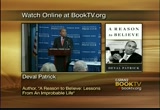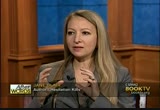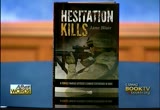tv Book TV CSPAN July 16, 2011 10:00pm-11:00pm EDT
10:00 pm
steady diet of know that they can't. i'm a policy level and personal level without a renewed sense of idealism, with all the risk of failure and disappointment that entails, an essential part of the national character, our can-do spirit will be in jeopardy. none of the big challenges facing this country will successfully be faced. ..
10:01 pm
>> host: major jane blair, you are the first woman to write a book about your experience with respect to iraq. why? why would you want to write a book. >> guest: thanks for the question. i have a lot of reluctance about writing a book, being a marine. i think there there's a natural tendency to want to not highlight my experiences to just be a marine and not get involved in writing with all that. after i had -- i realized i had some incredible stories about marines in here that no one knows about, so i felt these
10:02 pm
allegations for me to paint his portrait of my time in iraq. and highlight the stories of other marines that i served with that i felt had done such incredible things and no one was talking about it. i thought i have to commit to this paper because all the stories are never going to get told if i don't. >> host: that is very interesting because our men and women who go to war, they rarely discuss what they have seen, and so it is really interesting to have read "hesitation kills" and to see the perspective of a woman and how she deals with being in the military and how she deals with the whole aspect of war in the sense of hey i am targeting someone here and they are going to be killed. so i'm sure there was some hesitation when others heard you are writing a book, like your colleagues in the other marines because my brother was a marine and they are pretty tightlipped and pretty and tranced and they are pretty together and there's
10:03 pm
this wall of silence in a sense of what happens among the marines. how did they treat you when you said oh i'm writing a book? >> guest: actually everyone was very encouraging because i had taken the unofficial role of team the squadron historian so everyone knew i was kind of documenting everything that was happening as the war and folded and because my unit, which was one of the few unmanned aerial squadrons in the whole war, not just the marine corps but throughout combat operations, it was a really unique type of thing that we were doing at the time. it was the first time that we have employed uav's or drones in the capability so i think people were very excited to get our story out and i perceive a lot of positive praise from my colleagues surprisingly. i thought they would be very critical of it but i think that they are happy that their story is being told, because it is highlighting a piece of history really that a lot of people don't know exists.
10:04 pm
>> host: take us through this, because let's first discuss. you know, women have been in all of our major wars all the way from iraq to you and jessica lynch is the first p.o.w., woman taken in iraq for example. so let's go back to this whole issue because as you know one of the things i have been working on as the ranking woman on all the military issues in the house of representatives and for 15 years now my entire service in the congress being on the armed services committee, i have been really watching and seeing how the role of the woman is within the military ranks. so let's go back to something that is very important because you did something that i believe is very unique. you push the envelope in women being involved in combat in iraq. so let's talk a little bit about the first of all, what combat
10:05 pm
means. because you know some people think that women shouldn't be involved in combat. talk to me a little bit about that. >> guest: combat is an interesting thing because a lot of marines think to be in combat means you earned the combat action ribbon or you have reached a certain level or you have to be an country in order to be in combat. stepping back from that if you look at just the definition of combat it is any offensive action against enemy or foreign forces that result in some kind of conflict. you now with that definition in mind, i think that we have no frontline really right now in our current conflicts in iraq and afghanistan. people who traditionally wouldn't be in these kinds of combat roles are finding missiles very much on the frontline and that means support units that have females in them and or untraditional roles that people who didn't sign up to be in the infantry are finding themselves on this frontline. traditionally the combat was the
10:06 pm
infantry unit. now we find jessica lynch who was a supply person on a convoy and she finds herself in a firefight and she finds herself as the first p.o.w.. i want to go back to that and a little while because of course you were involved with some of that. you see someone like ruby who was in -- on the day that we -- the bomber got through the frontline and went into the cafeteria, to the mess hall and blew up the place. she was one of the people blown up so the reality is i would say that is the frontline. almost anyone is on the frontline now if you are in a place like iraq or afghanistan. >> guest: surprisingly women are often on a college for serving those rules because there were no combat roles for women and whether that is because of current policy or just because women are suddenly finding that because of the way that the wars are, they are being put in his place but i
10:07 pm
think there is a role for women in this capacity that they are finding you know, that policymakers find it very useful such as being interrogator translators are serving and civil affairs or being in the female engagement team which aids in helping the indigenous women and children in order to communicate with them. >> host: in other words when we go into afghanistan we going to the villages and we are trying to win the hearts and minds of the afghan people. we find that women sometimes are more effective than going in and talking to the women. of course guys can't go in and talk to them but they are more effective going into the villages and talking to them and getting good information about where the taliban is or who is aiding the enemy and more importantly what the town really needs in order for it to be more cohesive and stand on its own. so we can get out of afghanistan if you will. >> guest: absolutely.
10:08 pm
i think women are bringing in a new dynamic to the frontline and combat is always changing. the way that we conduct warfare is constantly evolving. we are no longer doing these first-generation force on force types of maneuvers that require that we have you no total upper body strength, that we are hiking for miles, that we are doing hand to hand combat and sure those skills are very important but right now on the battlefield forces are finding missiles confronted not only as infantrymen, but they are also fighting this ultimate role of diplomat and peacemaker where there is a necessity to have the role of discussing and finding out ways to -- combat resolution with whatever culture we are dealing with. >> host: even on the athletic field we found when we do the testing sure the guys have the upper body strength and that is important as mono e mono combat i would say that we are finding
10:09 pm
that women have better endurance. marathon runner women for example on average can run, can canada where more than the long trail if you will. so those -- women just bring a different set of skills to that and i think it requires both sets of skills to be the most effective military that we have. so, how did the marine guys feel about having women in the role because you had some very interesting specifics here about for example one of the lieutenants who, when you were second lieutenant he was a lieutenant who really didn't appreciate did appreciate you being around. >> guest: there are two points on that. the first is i think there are growing pains and becoming a marine. is not just boot camp and then suddenly you are a marine. i think it takes a while to really understand what it is to be a marine. it could take years. i think sometimes you see in the
10:10 pm
sergeant major of the kernel, the exemplar of what it is to be a marine but sometimes it takes a long time. some people get it when they are a lance corporal but others it takes years in order to reach that, what it means to be a true marine. a cousin of that, you think for me there was a lot of growing pain at the beginning. i grew up in a very nontraditional military environment. knowing my family had served there was a lot of growing pains for me to figure out not just the jargon and lingo but how to act like a marine and say yes maam and mr. and follow orders. so, in my new unit when i first became an officer checking in i think there's a certain right of package that -- that a second lieutenant has to go through where you are the youngest most junior member of your unit and you have to prove yourself before you are accepted as a member of the fold. there was a lot of that going on
10:11 pm
and that happens at almost any job. >> host: you have to feel your way around about who really works, to which they get to person, who is always angry about anything. you kind of have to know what is going on is the unit and it is more important i would assume if you are going up to warn you depend on these people to keep your life. >> guest: absolutely but i found something different may be in a civilian job that i found was the idea of surrendering my sense of the purse on or identity of the things that were not marine like. whether that meant being feminine or whether that meant you know, things that were not considered in the ranks for example, nail polish or make up. you have to surrender those things because if you really want to get integrated and incorporated into the marine corps you have to learn to be a marine and that means not making excuses, not having any kind of behavior that is different from
10:12 pm
what is accepted. i found that by surrendering that in letting go of things that after a while i think became kind of trivial to me, people accepted me as a marine and they would look to me as a marine first before looking to me as a woman or a man or looking at me as that before a marine. >> host: really because in the book you talk about one for example you were over in kuwait and iraq and you were surprised at one point that man
10:13 pm
and so i think initially people are always like okay i don't know what to expect. is she going to ask for special favors? is she going to expect me to help her or what not? but, i think one to prove that you are going to do the job, people except you and it takes maybe a little bit for them to start thinking of you not just as a female or to think of you as okay, this is a marine and except you. i remember candid discussions with some fellow lieutenants of
10:14 pm
mine who said, you know, i forget you are a female sometimes when we are discussing topics and then they will pop back in and say oh my.i shouldn't be saying that in front of you. no, i'm just one of the marines here. >> host: there are other as with any good writing, again i'm going to tell you this is really -- and i really enjoyed reading this. there are several stories. you are talking about beyond manned air vehicles. you are in charge of them basically and what people don't know or they may know but it is not traditional. it was new at the time and a particular at the beginning of the iraq war. it is where we fly these unmanned vehicles over the area of the battlefield, either to get recognizance or to figure out what is going on ahead, or actually overhead and we see an
10:15 pm
engagement of troops and then getting that, seeing that and getting that information back to the person on the ground so that he knows the enemy is you know just over the ridge and be ready to shoot or he knows it is the convoy coming or there are too many enemy troops in front of us. we have to go and hide someplace for a while. not that marines would hide but you know what i'm talking about. way overwhelmed. so that his combat. wouldn't you say that is combat? you are seeing the big picture of what is going on. that is unusual. you are on the cutting edge of doing that, and you were also -- you didn't know, did you? you didn't know whether you are actually going to get to participate. you had trained for this. you were there and loving a group that does this but there is this whole thing about oh my god we have women in our unit. talk a little bit about that because it is sort of a theme going through the book.
10:16 pm
>> guest: okay first of all, i joined the marine corps during peacetime and so there was sort of the understanding that i would never really go to combat according to what i've heard from the recruiters and other people. oh yeah in all honesty you are going going to be in some support unit. but i really took that seriously and i thought if i have to go to combat, i am going to do my duty and do that. so, calm, when was it? november 2002, my unit starts spinning up with this idea we are going to go to iraq. my commanding officer that i mentioned in the book, the story, he pulls the two female officers, myself and the other female aside and he said look, by order of congress you guys are not allowed to go with us to combat to iraq as we are going to be pushing ahead of the infantry and we are doing some very untraditional operations which are going to put us ahead
10:17 pm
of the ground forces. we set i'm going to fight for you guys and get to kuwait and see what we can do but i have told higher headquarters that 13 females that are going, the unit is not going to be effective without these females in the unit because we represented not only the collection portion but one of the females was a pilot for the drone. we had other females who were very important support functions. so they formed the backbone of the unit and every section of communication, marines. without them we were really going to be sort of a skeleton crew. my co, my commanding officer said look i'm going to push for it as best as i can. i'm going to get you guys to kuwait and see what happens. if i have to leave you in in kuwait so be it but we are all going to kuwait. we get to kuwait and they sort of forget about us. there are a lot of things happening. the war is about to kick off and they don't have people to come
10:18 pm
replace us, so i am guessing that they just realize they had to sort of leave us in place, that we were not going to be an effective unit without us being in that unit. so as a result of that, when we got the order for the war to kick off, we were ready to go. then it dawned on me, wow i guess i'm going to combat. i guess i'm going to iraq. and i was actually happy for it because i wanted to be with the unit of course and do the mission, and i think all of the females were expected and excited about the idea of going with the unit and glad that we had not been forgotten about. >> host: that was a crazy time i remember because we had a vote in the congress about whether we would go to iraq or not in that happened in october brett before the november election. yourselfe in november and were sitting around and sitting around and
10:19 pm
sitting around. of course we launched in march. so you find yourself in iraq. give us a little bit of what that felt like. did you wake up every morning with adrenaline going? did you have your gun with you all the time? oh and by the way the second story going on through that is that your husband, peter, is also a marine. and he is gone already into iraq. so you are in kuwait and he is in iraq. you are in iraq and you don't know where he is. talk to us about the day that you actually did get to see him and what happened. >> guest: well, there are two stories. is kind of a love story too does my husband and i got married right before we went to iraq. >> host: you wanted a big wedding and everything and then you were like oh holy gosh. >> guest: we planned for may of 2003 which needless to say was not a good date after all so
10:20 pm
we ended up postponing everything. his unit launched ahead of mine and they deployed sometime in very early january. so we had got have got married two weeks before and we didn't know how we were going to communicate because i had have his address, but he was not going to have my address with the -- so there was no way for him to get letters from it. we spent the first couple of months having no way of communicating and so there was this expectation of a oh gee i hope i will see her out there in kuwait or iraq somehow. i had some good units in higher headquarters who kept me in formally -- they let me know his unit is over here and i pray that i didn't hear any news of anything bad about that unit because there was just no way to really know what was going on with his unit or him at all. so it was weird because at the same time i was a spouse and trying to grapple with the
10:21 pm
feelings of i am a newlywed and i really miss my husband but i have a mission to do so i can't think about him right now. i have to focus on what i'm doing here. and so it was hard up that point, especially being newly married. i think i felt wow, what happens if we are killed and i never even really get to know my husband at all? >> host: that happens to a lot of people. >> guest: yeah it does. >> host: world war ii first of all imagine all the couples that got married before a men went off, mostly men went off to d-day. we just passed the day just 10 days ago, the anniversary. so there was a lot of that going on. at least today we have something other than just snail mail coming across on ships. we have e-mail and we have the phone and you know we have a better chance to communicate. what happened on the day that
10:22 pm
you saw your husband actually in iraq? >> guest: the day i saw him was before we kicked off going into iraq. >> host: you were in kuwait? and he was also? >> guest: yes. i had the privilege through my job is actually going to the meetings near where his unit was located but after going to some of those meetings, his unit was off doing some kind of exercise so we had failed to meet several times and i had left a note for him in his unit so we kind of knew he was looking for me and i was able to pass my mailing address to him. we would write these ridiculous letters that would say on the envelope, unit to unit mail in huge letters so they wouldn't routed back to the united states and then back again. we found out later that was exactly what they were doing. they were sending it to the united states so was taking a month instead of two weeks. >> host: like you when you lose your baggage on an airline. >> guest: we saw each other and it was really great because
10:23 pm
i feel privileged to have that opportunity to see him first of all. it is hard to describe it as romantic. >> host: it was funny. i started laughing the way you discussed it disgusted and there are. [laughter] >> guest: my husband was in one of the humvees and we drove over to the frontlines of kuwait where we were and we just looked out into the desert and both realized kind of the absurdity of the situation, sitting there looking over into iraq and just what was going to be in front of us, both knowing that we were soon going to cross that threshold into iraq. it was really interesting and like something out of a movie. >> host: surreal. >> guest: yes, very surreal. >> host: when your husband left first, you were at twentynine palms and you don't give it a very good -- i am out there in orange county and
10:24 pm
twentynine palms is an hour to the east of us. you weren't very nice to california talking about it but it is a great place because that is where we can put everybody out there and they can train in more like the circumstances of what they will see in iraq or afghanistan. so you are living out there. you just got married. you bought a house and you are hanging out. your husband leads and he leaves you a letter that says, if i die openness of. i'm not going to tell people what that said. i think they should get the book and read it, but did you ever opened that letter? >> guest: not until iraq, but i definitely felt like opening it in the times. i kept it because i wanted something to look forward to when i needed to read it. so i kind of leftist like a last resort type of thing, open when
10:25 pm
needed. it was sort of a bedrock of folding with iraq. so it was kind of a nice gesture on his part to just leave me was something i felt knowing that i would be following soon after to kuwait and iraq. >> host: so it is a love story and you are still with your husband and everything is good and everything is worked out. okay. being in iraq. and ordering what you knew, looking and ordering, telling people hey you have to go and basically dropped bombs on these guys or do something to the enemy. you were one of the first to do that as a woman. how did that feel? >> guest: you know, first of all, you know, killing in itself is something that is a moral decision that i think every combatant has to grapple with. the idea of am i ready to kill and what are the moral results
10:26 pm
of that and how was it going to affect you afterwards? there are some great looks out there on killing and it talks about the effects of killing on a person and what that means and the results afterwards of grappling with that. so, part of that is beyond manned aerial vehicle, when we were calling for fire on iraqi's there is a certain level of distance that you feel. okay, their lives down there but i'm not looking at them in the eye, staring at them face to face so at the same time he feel like you have seen the picture. okay, i know that unit is about to call fire with their artillery on friendly forces on the marines that are coming down the road, so it is my job to -- so i felt very much throughout the war and in iraq that my job was sort of as the protector of the forces. >> host: getting back to the
10:27 pm
title of the book, "hesitation kills" if you see something and you see it you are either going to order the kill or they are going to order the killing your people. >> guest: exactly. you only have a moment to decide this and you have to think beforehand, what am i going to do in the situation? you don't have time on the battlefield to discuss those issues are think about and grapple with them. you need to think about those before and know at the moment exactly what you are going to do and executed execute it because you only as a moment sometimes. it could be at the risk of somebody else's life or greater casualties or risk putting your own unit at risk as well. >> host: talk about the day that you were going to go out on the road to an area where there was a lot of activity and that might've put you more in a mono e mono situation. you didn't go off and you heard the next day that, or the fuel truck didn't come. so you didn't go up. someone else did ahead of you.
10:28 pm
how did you feel about that, because they really did what you might have been doing. >> guest: yeah, that moment was probably a think with my unit talks about the most is being the hardest moment. i've talked to my commanding officer since then and we have kept in touch and also my sergeant major. we talked about this particular moment a lot because had we gone through the area right when pfc lynch was going through that critical area of nasiriyah when it was unexpected amount of forces fighting against our unit and basically our units became entrenched in that area and it turns out there was a lot more combat than they had expected. so we were initially supposed to push through that area and go north to an area called out quds and launch our uav's from that area so we could look at the ground forces. we would be in advance of them and be able to see what the
10:29 pm
threats were. we were hearing strangely enough on the radio that that area was just being lit up. >> host: what does that mean? >> guest: they were just being attacked by the iraqi forces. they were being met with armored units and very strong resistance, and unexpected amounts of really iraqi armored unit forces at -- that were entrenched. >> host: so you could have been there. and instead would happen? >> guest: our uavs require a certain kind of fuel so before we were able to go forward we had to get the fuel, which was aviation gas. so in order to fly uavs we need to get it so we set up a fuel truck which takes a half an hour or an hour to go back to where the tanks were.
10:30 pm
but we kept waiting and the fuel truck never came, so we had in order to go forward through nasiriyah but we couldn't go anywhere without this fuel truck. >> host: jessica lynch and others went that day? >> guest: exactly. >> host: of course we know what happened with her and the end of the story with jessica lynch? did you have any involvement with that? >> guest: we flew the uavs for that mission, flying over the hospital when they were doing the pfc rescue so we got to watch the whole thing through the lens at least from the rooftop and we also did they scout out beforehand so we were flying over nasiriyah looking for critical nodes or indications where lynch might be >> host: to collaborate information or mothers. that is what we try to do. when we went over -- after osama bin laden in pakistan. we actually had her heard that he was there maybe a couple of years before but you really have
10:31 pm
to fine-tune and continue to look for information that collaborates the story that people are telling you so you have a high chance that in fact, that does happen there, right? so if you send troops and you are really going after osama bin laden or going into gets jessica lynch. >> guest: exactly. they indicated she was in the city so we were part of a collaborative effort. it resulted in her rescue. you know, and actually i think that is i think one of the shining moments. my marines were spectacular and we were able to look at it and analyze it and see things that i could not have understood. they just did a phenomenal job and thanks to them, like they really saved so many lives on both sides really. it was their great effort that led to just a huge success for
10:32 pm
the marines. >> host: i have some other things to comment on. your mother is puerto rican so you are part latina if you will. do you know spanish? i don't even know if you do. >> guest: unfortunately not, the great embarrassment of my mother. >> host: do you understand it at all? >> guest: a little bit, yeah. >> host: of horse you know arabic tissue spence of time in egypt. i did also when i was younger and i studied arabic in school. did that knowledge of other languages help you while you were in iraq or in kuwait? >> guest: absolutely. after high school instead of going to college right away i traveled travel for a year and a half and it was during the gulf war. i started off in greece and through my parents and have been as i went to the middle east and lived in egypt and israel and jordan, specifically during that time period not.
10:33 pm
so in terms of just the cultural knowledge that i accumulated but also just a language skills too and i fell in love with the middle east from a very early age. due to studying history and looking through and looking at all the arts and the egyptians and history. but, so my love of the middle east and lead me to study further. before my unit went to iraq i became sort of a cultural expert and taught classes on appropriate behavior around muslims and just about the culture as a whole and part of that was also some arabic language and familiarization classes for them. a group of us, we started studying the language and i became the unit interrogator translator, basically just a person who whenever we -- ran
10:34 pm
into an iraqi would talk to them. it is extremely useful because on several occasions we were able to de-escalate violence that could have resulted in -- was able to talk to them and find out what they were doing. >> host: how much time did you spend in iraq? >> guest: i spent this deployment, so early on i don't know how many months it turned out to be but certainly not the amount of time that people are deploying today. people are going for a year and a half now. >> host: marines originally as i recall, we put them in for six or nine months depending on an mos or what they actually were doing for us there, and of course our army, boots on the ground actually in iraq originally we had them and for about 15 months or so. we have now pushed them back to a year but it is a long time to be in the war. talk to me a little bit about, i guess you discussed it a little
10:35 pm
in here in a the book about being out or all the time, every day and then coming back to the united states and how you go from bad situation to de-escalating in a sense. your body and your mental state and everything, to be able to flush back into regularity. >> guest: it is certainly an adjustment and i really feel for the soldiers, marines and servicemembers who have a hard time adjusting back because it is an adjustment. when you are in that alpha mode kind of, i have to be alert to everything around me all the time, you develop this sort of mindset, a very aggressive mindset of looking for threats constantly around you. so when you come back to america, you are still sort of in that mindset and it is very hard to just relax. for me, crowds were really hard.
10:36 pm
i couldn't get near a crowd and i still have some phobias about crowds and whatnot. >> host: because in iraq if there was a crowd there was a likelier problem and maybe somebody doing something to you and hiding within that crowd. >> guest: absolutely. you have no control over a crowd and you don't know what will happen, could escalate into a mob type seen. your mind triggers back to okay can i drove -- control the situation i'm in? do i know where the threats are around me and so even coming back i think there is a possibility of okay what is the situation around me? are there any threats? and i still think that way a little bit. you are never completely out of that. >> host: as a marine i know this is a hard question. a summary and when they come back, whether you are a woman or a man you are supposed to be macho and not supposed to seek help and you are supposed to be able to reintegrate and what we are finding more and more because we work with our healthy
10:37 pm
soldiers in the programs at camp pendleton. sometimes you really need to go over and talk to somebody and get a plan on how you'd de-escalating come back. do you think marines need that now where do you think there is still the i am strong, nothing wrong and i'm going to be a lot to do this on my own? >> guest: i think people are starting to ask for help and there is not as a, sort of -- people aren't looked at any more for asking for help because it is something that affects everyone differently. i have seen people trying get over post-traumatic stress disorder or even just the trauma of being a combat situation in very different ways. everyone has different coping mechanisms. writing the book was actually very cathartic for me. i got it all out and i said it. i felt like it really helped me quite a bit. but i saw marines who were
10:38 pm
dramatically affected in my own unit and it was really sad. some people became very withdrawn and others turn to drugs. somme had violent acts and you know it it is just unfortunate because i think people have reached out for help and no one is going to look at them as being week. people need to take care of themselves and there are great brands out there for people to take care of themselves now. i wish that marines and any servicemember would take advantage of those opportunities because life shouldn't be a burden. you shouldn't have to live with those memories of the time. and think there's a constant threat towards you all the time. >> host: so in the book you have several instances where enlisted don't know or they see you but they don't know that you
10:39 pm
are their superior. tell me about one of those instances and how do you overcome that? how do you overcome the fact that you know early on in the book he said something to the effect of one of the soldiers, one of the marine said to you i never salute women. [laughter] >> guest: yeah. well, i was very young and especially then i looked really young. >> host: you look very young, by the way. >> guest: back then even more so and it was very strange. when i was in a kuwaiti airport there was the senior enlisted marine. he was with his friends on the side and he came over to me and he was like maam, how old are you? he saw my rank so he thought i was 22 and i think it was 29 at the time. i said, you know i'm 29. he said you know you look like you were 16. he didn't say it in a negative way. he was just so surprised because they looked so young in uniform.
10:40 pm
>> host: any instances where they were just downright not very nice? tellis. where is an instance where somebody mistreated you or when you our brain to them. of course it is taboo in the military. you are always checking out rings trying to figure out what your pecking order is. >> guest: i think sometimes maybe not so much anymore but people will try and walk by them and see if they can get away with not saluting. >> host: what do you do? >> guest: you go up to them and say hey i'm an officer in some kind of respect would be nice and you in you correct them and let them know hey, i rate a salute just like any other officer. so i mean there is a culture still of a thing like that but it is a small minority. those aren't your good marines really. they are just marines who.
10:41 pm
>> host: they don't understand the importance of being in the core. >> guest: it is not even a female male thing or an officer acting superior. it is just a custom and courtesy of the military, and so part of that is rendering a salute to officers. so i never let anyone get away with anything. >> host: and do they, do they bristol at the fact that you go over them -- to them and say hey i am i'm an officer andy disney right now? >> guest: no, thankfully throughout my time in the core and had some great leaders. one of the people i respect most was colonel wallace. he was one of my first commanding officers and i remember him particularly because when i was a young private first class straight out of camp, enlisted, he came up to
10:42 pm
me and should high-handed treated me like i was an important officer. i always remembered throughout my time knowing him and looking at his leadership that he treated everyone with such respect, no matter what rank you were. i always try to follow his example all the time at being respectful. if there was something that i saw a wrong and another marine i would correct them but in a respectful way, not in a way that would put them down. everyone has faults and sometimes it is just a matter of correcting it and trying to correct it in a can shut that way because i know that correcting it in a nondestructive way doesn't help anyone. people would respond to that and generally i would get a sorry or apologize or something. >> host: there was another woman officer in your unit and she just couldn't wait to get out. explained that. here you come and you are a newly minted second lieutenant and you are coming over and you
10:43 pm
are excited and you are patriotic and you are starting to get this real thing about being a marine and you are excited to do your job and everything. the first day you run into someone who is like i can't wait to get the heck out of here. what happens to her in that situation and why? what was the difference in the way you found the core and the way that she found being a marine? >> guest: you know i think the separating factor in why sometimes people decide to get out is because you have to decide whether you are going to integrate and sort of except that marine like spirit in you. if you hold onto facets of your life that are not marine like. for examples she is a lovely person and everything but she just didn't want that gung ho type of lifestyle. she didn't want to be the uber tough female. it was just not part of her character. she didn't want to emulate that are become that so for her it
10:44 pm
seemed like it was always a struggle to give get upset at -- accepted or be accepted at face value whereas for me i was constantly pushing it like hey, i demanded that sort of respect because for me it was important to be a marine and it was important to do my job and sort of be the officer and a the leader for the marines doing this mission that i felt was very important. not that she didn't. she was very competent officer in everything but for her, i mean she had about. she just saw that it wasn't for her and she didn't want to aspire to that type of model. >> host: to another question that i have because of course i have been fighting -- i was one of the first unspoken lessons that you learn if you are not in charge of the bottom-line of the company you are not going to get to be a ceo.
10:45 pm
if you are in charge of human resources they're not going to consider you. if you are in charge of the manufacturing of the profit and loss that you have a shot at being ceo. so, that marine term number one duty as combat. so here we are and by the way the congress is not a congressional law. is not a law that we passed that says that a woman can't be in combat. we actually in 2005 said the department of defense gets to decide that. it is a policy of the department of defense and that is why when we talked earlier about looking at mos's and other things that might be able to be no. the congress in 2005 and initially the congress said no women in combat in these pretty you are areas but in 2005 we change that and we said, listen you decide that if you are going to change you have to come in and supposedly the congress will stop you from doing that but it is really the dod's policy right
10:46 pm
now. so they are looking at that. but, you know, how do you -- so if you are a woman and you don't get to go to combat, even if you are already there like jessica lynch was. i would say that was there, like ruby rubicon was in like you were, then one of the general said one day this is the reason why we are never going to have three and four-star women who are generals because if you are not in charge of combat or you can show that you are in combat when you move up the chain and you are competing because you know it is move up or get out at some point, right, with the officers? if you can't show that in fact you have been part of what the marines is really about, the guys will get promoted over you. so how do we change that? what do we do about that? how do you react to that? >> guest: of course it is a difficult issue because women
10:47 pm
are excluded from a lot of jobs in the military. all the combat roles essentially and that means offensive grounds units such as infantry, artillery, armored units and things like that. and it creates of course a vacuum that women cannot -- they reach a certain plateau and it is hard to get promoted after that because they can't get any of those other experiences. >> host: so would you say we should change it and what would we do it by saying we are going to have different standards for women that want to move forward? first of all would you? would you allow women to do some of that? would you broaden their ability to have combat experience and what kind of -- what kind of help or what kind of changes would you make so that you could ensure that we so more him and could be in those ranks?
10:48 pm
>> guest: as you said dod is looking at those issues right now in they are going to be able to assess the best way of really thinking if women can get integrated into those roles but from a personal perspective i think women are already serving in some of those capabilities and are capable of meeting those missions on many fronts such as the female engagement teams or civil affairs. there should be certain allocations for women in these slots. postcodes so you want to see three and four-star generals? >> guest: absolutely but i don't want to see that the cost of lowering standards. i think they should look through the different jobs and determine what is the standard necessary to do this job? it is not just women who might not be able to meet it but i've also heard stories about an infantry officer who gets a 100-pound guy in his unit and says oh he can't lift the 100-pound shell that weighs the same as him so that we he can't do his job even though he is technically qualified to do that
10:49 pm
job. it is not just women. actually making a physical standard for each job would put the most effective and right people in that job whether women or men. postville i have always said that. not every man makes a good soldier. not every woman makes a good soldier but if a woman can meet the standards and she wants to do it, then why are we holding her back from trying? >> guest: absolutely. putting that artificial piece on her. postville okay so my next question is out of all the stories he told in this book, there were several in which -- when you were in iraq or kuwait, what was your most troubling or most difficult situation? >> guest: well, there were so many.
10:50 pm
>> host: you don't want to give them all away. >> guest: actually i would say the beginning was the hardest because i was just learning to grapple with the idea of when we were actually still in kuwait, that is my unit was still in kuwait grappling with the idea of being in combat in kuwait so when the scud missile started getting launched we thought they were coming towards us because we would get these notices from higher headquarters that said scuds inbound and we were trying to swat where it was going to land and we would hear the patriot missiles fireback. you really felt that suddenly i am in combat and there is like gas alerts going off in everything. so that was hard and especially because i had to control the mission at the same time in terms of looking at what the threat was. there were some very critical things we were doing at that time which was we were looking out of the oil wells and determining if there was any
10:51 pm
deliberate damage on behalf of the iraqi forces because that was the indication that we were going to launch the ground war. our unit was passed with this mission of keeping an eye out on this whole southern region. coast guard remember you brought that in the book. so you started the war is what you are saying? >> guest: well, i didn't. my marines did. [laughter] i had this really savvy, smart marine and he was just great at looking at the imagery and so calm. he just said very mary -- matter-of-factly to me he said mama think there's some damage on one of the oil wells. i knew that once we said that and put that out there, something was going to happen. i asked him, are you sure that is what we are seeing. he was very methodical and said i don't want to say that. we went back and looked at some other oil wells out there and sure enough we saw deliberate damage where fires were being laid off and streams from the oil wells and gas explosions and
10:52 pm
things like that. so when we reported that back to higher headquarters, they immediately came back and within five minutes or 10 minutes they said we are going to launch the ground war early. so at that moment. >> host: so here is a question. when i started on the armed services committee 15 years ago when i first got to congress, one of three on the committee out of 63 members are gone now of course i'm the most senior, third in line for the democrats. when we first started back, we would actually have a vote on an annual basis for the first two or three years to just get rid of women in the military. on that committee, on that armed services committee, some democrats and some republicans would vote to kick the women out. in fact it wasn't until we brought the bill to the house floor that having more women and people in the congress that we would put women back in the
10:53 pm
military. even 15 years ago people are saying women are just a problem in the military. my question to you is, do you think, and how do you think the role of women in iraq, in afghanistan today, do you think it is changing the minds maybe not of the american public because they don't see it so much but the minds of our military leaders as they see women perform? >> guest: absolutely. i was surprised to see what women were capable of. i had stereotypes and expectations before it went into the military of whether i was capable of doing it or not and i was surprised at women's women's capabilities both in boot camp and officer candidacy school of what i was capable of and what other women were capable of and just seeing that on many occasions that we could compete with the men.
10:54 pm
maybe we had some physical limitations but as a whole be redoing the same type of training that they were doing and that is forward to our military unit that we would be integrated training after boot camp where we would conduct missions the same way they wouldn't go through the same exercises and training and everything. i was always -- women's capabilities and not only that, but having served later as a marine attache and working with foreign military, i was surprised also at how positive i was received especially in that it was an unexpected thing for them. when i was in jordan for example i was the first woman to serve in that capability, that capacity by people were very receptive of it and initially they had some hesitation about putting me in that role because they were sure they were going to be receptive to that.
10:55 pm
but it had opened up doors for me about what women can do and i think it is fantastic because women have -- bring to the table in terms of diplomacy or civil affairs, that are different from men. and i think just like any other field, you can't take them and out of the equation. >> host: 50% of our population, so you are just saying no women in at all then you are taking away the pool from which you can draw our very best. our marines or our soldiers. >> guest: absolutely. i was never huge advocate for women in combat and tell a started investigating the whole issue. >> host: have you seen it? did you see it in iraq? is it coming down? is it going up? >> guest: this is an issue i get asked about a lot and in my
10:56 pm
own personal experience i haven't seen much of it although i do know it does happen. when i have seen it i have seen it dealt with very effectively and swiftly. where the officers in charge will carry out the equal opportunity policy and ensure that it is complied with the soonest possible. so you know, it happens. it happens in civilian life too, not just in the military. whenever you put men and women together i think it is bound to happen. the strange thing is, i felt less discriminated against in the military than i did in the civilian capability. i worked in some companies before i went into the military, and also in a contracting company after the military and i was really surprised to find that people treated me more like a woman and not capable of doing basic things then in the military where people just sort
10:57 pm
of treated me like a marine first and then as a woman second. and just how different that was. part of the reason i wrote the book is to really show that there is a role for women in the military, a positive role. i had read so many books that per trade women as always having a negative experience and i wanted to show there is a positive bank that can come out of that as well. >> host: you are a reservist now and your major is one of the toughest things to do. everybody says if you can get past major, lieutenant colonel or kernel you will be great. the last question for you before we end here, "hesitation kills." you have had a good experience and he wrote the book because you had a good experience. it is also a love story as you indicated before. i hope people will read it. peter, your husband, if you have a girl, let's say you have a baby and you have a girl would
10:58 pm
you tell her yeah, okay to go into the military? it is a good career. if you want to be a marine, be a marine and be all that you can be. what would you say to your daughter if she came to you one day and said mom i want to be a marine? we have about one minute left. >> guest: i would probably train her. [laughter] that is just me. >> host: is there enough training? >> guest: it is exactly the same. >> host: okay so you felt good going in. if you had a daughter and she wanted to be a marine and ufr d. taught her to shoot, the way she would go. i am a marine. >> guest: exactly. >> host: jane, major jane blair thank you for having written "hesitation kills" and i hope that the viewers will pick up a copy and read it does i really found it incredibly
10:59 pm
great. >> guest: thank you so much, maam. it has been an honor. >> that was "after words" booktv signature program and with authors of the latest nonfiction books are under five -- interviewed by legislators and others familiar with their material. "after words" airs every weekend on booktv at 10:00 p.m. on saturday, 12:09 p.m. on sunday and 12:00 a.m. on monday. you can also watch "after words" on line. go to booktv.org and click on "after words" in the booktv series and the topics listed on the upper right side of the page. >> what are you reading this summer? booktv wants to know. speak to books that are "the storms of war" by andrew roberts and a book
125 Views
IN COLLECTIONS
CSPAN2 Television Archive
Television Archive  Television Archive News Search Service
Television Archive News Search Service 
Uploaded by TV Archive on

 Live Music Archive
Live Music Archive Librivox Free Audio
Librivox Free Audio Metropolitan Museum
Metropolitan Museum Cleveland Museum of Art
Cleveland Museum of Art Internet Arcade
Internet Arcade Console Living Room
Console Living Room Books to Borrow
Books to Borrow Open Library
Open Library TV News
TV News Understanding 9/11
Understanding 9/11


























































